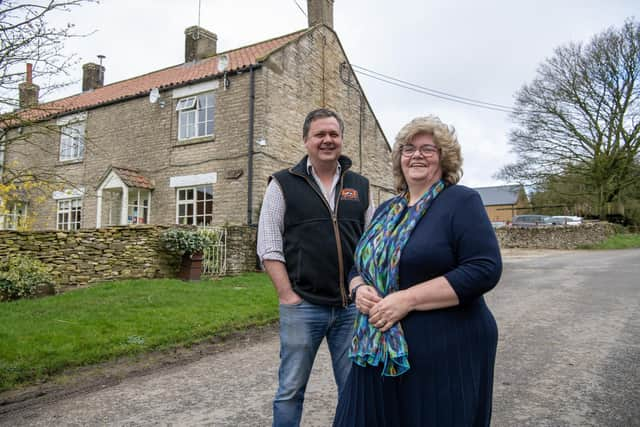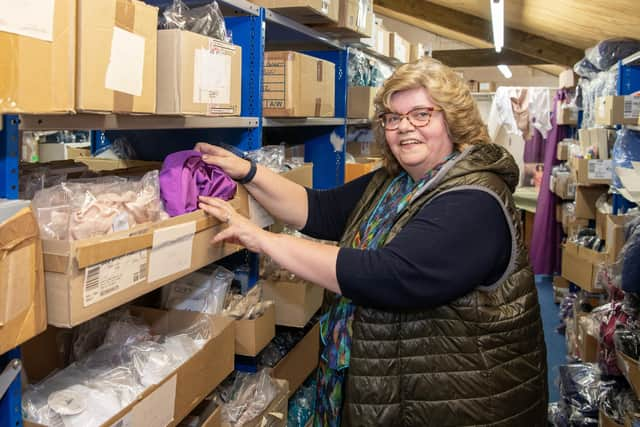Farm of the Week: Ample Bosom bra entrepreneur on the family farm in the North York Moors
Sally’s Ample Bosom bras online enterprise based at the farm has brought her international recognition, has seen her story taken up by a movie deal and celebrates 25 years this year, but Sally explains it could all so easily have been set on a farm much further north.
“My late husband John had wanted to move to Scotland,” says Sally. “We went to look at farms up there. I’d said that if we were to move I’d want to start another business and that led to selling bras online. The bigger bras were always more difficult to find in shops, as all ladies who need them know, while the little girls have always been able to get what they need more easily, so I decided that’s what I’d sell.
Advertisement
Hide AdAdvertisement
Hide AdThis was the time when online businesses were just starting in earnest and Sally says one of her first thoughts was coming up with a name.


“I didn’t want something like Bras R Us, I wanted something with a bit more about it and John and I came up with Bras Online and Ample Bosom. We had thought there would be two businesses, but the success we had with the press latching on to it meant it all merged into one and became Ample Bosom. The beauty of the name is that ample doesn’t mean big, even though people perhaps presume that. It means sufficient.
Sally and John never did move. John passed away twelve years ago. Sally remarried ten years ago. Sally and John’s son Stuart has run the farm since his father died, as well as working full-time for precision farming specialists Trimble Navigation, looking after the holiday accommodation when Sally isn’t around and being dad to two young sons.
Sally says she travels to the farm from Welburn near Castle Howard where she lives with her husband Stephen Till, also a farmer.
Advertisement
Hide AdAdvertisement
Hide Ad“My parents were livestock hauliers in Slingsby, my grandparents were farmers. I don’t think I ever considered anything else but farming. I go back to Old Byland every day to look after the bra business and the holiday cottages.


Stuart says he can’t see himself living anywhere else and that he’s just put in plans to build a new farmhouse. He’s increased livestock numbers at Valley View Farm that runs to 220 acres and that his father moved to in 1961 when 17 years of age with his parents, Stuart’s grandparents.
“We have cattle and sheep,” says Stuart. “We have a suckler herd of 20 Beef Shorthorn-cross cows that we put to a Limousin bull. I’ve added them to what we used to have when dad was here. I will have had them 10 years and I brought on the suckler herd to eat forage and basically manage my grazing land. Before that I was mainly sheep and they wouldn’t eat the forage that was in surplus at certain times of year.
“I usually keep some heifer calves as replacements with the rest going to Thirsk livestock market.
Advertisement
Hide AdAdvertisement
Hide AdAnother recent addition to the cattle business at Old Byland has been a bed and breakfast arrangement with Stuart’s near neighbour Charles Ashbridge’s Taste Tradition business.
“We’ve been on with Wagyu and Belted Galloways for two years and we will have 80 on at any one time. I can get cows coming to me from Charles on short keep for as little as a fortnight or I get yearlings like a Wagyu steer which went to abattoir and weighed 540 kilos deadweight. It all depends what he’s got a market for. I get paid for keeping them.
The third element of Stuart’s cattle enterprise on the farm is fattening dairy-crossed stock for market.
“I have 100 British Blue-crossed dairy stock that a livestock agent buys out of Carlisle and that come to me for fattening. I get them at around 4 months and they go to Thirsk livestock market at 14-16 months. They used to want them at 12 months but the processors want them heavier. My father had very strong ties to Thirsk auctioneer Tony Thompson and I’m happy with the price we get from there.
Advertisement
Hide AdAdvertisement
Hide AdStuart’s flock of 500 North of England Mule ewes is made up of what amounts to 150 that he generally aims to buy in-lamb during December and January from dispersal sales.
“When you buy from a flock dispersal you can buy some that are a year old and some that might be four years old,” says Stuart. “Anything I buy is to lamb in March and everything else is in the May lambing flock.
“I lamb everything here and then everything goes to Bramham Park for around 12 weeks where they are finished off grass. I rent ground from the estate, which helps their grassland management. I start selling them at Christmas and what we don’t sell at Christmas will go to market in March with everything going to Darlington livestock market.
“I can’t finish anything off grass here, because it just gets too cold. I get one cut of grass for silage usually at the end of June.
Advertisement
Hide AdAdvertisement
Hide AdValley View Farm also has some conservation designated SSSI (Site of Special Scientific Interest) land and is in a Higher Level Stewardship scheme and as such Stuart is renewing drystone walls using walling contractors.
Stuart’s two boys Theo and Albert, eight and six, are both keen fourth generation farmers but Stuart is aware of their age and taking things easy. There will be no pressure from him for them to become the next generation.
“I studied for my HND in agriculture at Bishop Burton College for two years. If the boys want to farm, as they grow up, on a night and weekend, I will do it with them. If they want it there will be opportunity.
Sally’s support to the farm staying as a farm through diversification started when she began a bed and breakfast business in the Valley View Farm farmhouse in the mid-1980s.
Advertisement
Hide AdAdvertisement
Hide Ad“I trained in hospitality. I had the first ensuite rooms in the area, just two rooms. You got to speak to people in different parts of the country, different parts of the world.
“With the help of a grant we then converted an adjoining barn into six holiday cottages in the 90s. We keep updating them and they now sleep 22, three that sleep two, one that sleeps four, and two that sleep six. I had the good fortune to have a good architect in the village who guided us through the National Park planning.
“We’re having new kitchens and bathrooms fitted this year. They all have flat screen TV, are all internet connected and have fast broadband.
Sally and John had two sons. Sally says Peter now works with AgBot, the business that produces driverless tractors.
“When Peter was at university he sold internet to the village. That’s one of the ways in which he took himself through university.